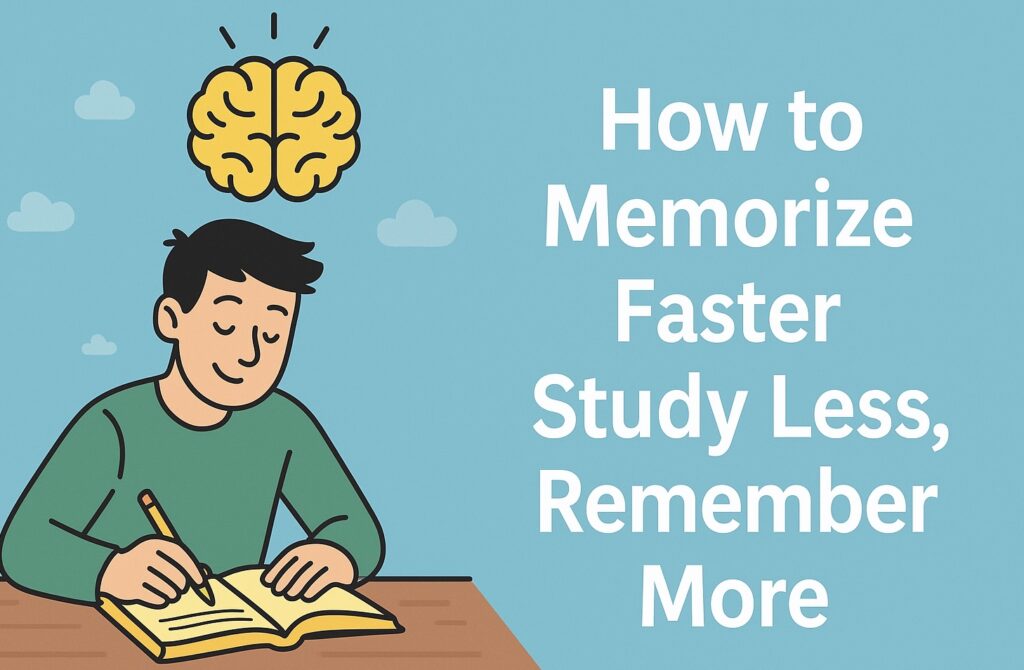
How to memorize faster-Do you often find yourself studying every day but still not remembering things? Or do you study, but the information doesn’t stay in your memory for long? If yes, then there’s no need to worry. I’m going to share some tips with you that will help strengthen your memory and allow you to memorize things more quickly.
Table of Contents
How to Memorize Faster – Study Less, Remember More
1.Visualize to Memorize: Train Your Photographic Memory
Whenever you study something, try to imagine it ,create a photographic memory. After reading a sentence once, close your eyes and visualize that line from the book as if it’s a picture in your mind. This will help you retain it like a photographic memory.
When you read a paragraph, try to highlight the important lines with a highlighter if possible. Then, close your eyes and visualize that line and the page from the book for about 3 minutes. Repeat this process 2–4 times. By doing this, you’ll be able to remember everything much faster.Whenever you read a paragraph, break it into smaller parts and then try to create a photographic memory of each part.
2.Speak It, Then Think It: Boost Memory with Dual Reading Technique
First, read out loud while speaking the words clearly. Repeat this a few times. Then, read the same content silently in your mind. Repeat this process, and you’ll start noticing significantly better results.While reading out loud, make sure to keep your eyes focused on the paragraph and give it your full concentration. Then, try to read while thinking deeply about what you’re saying.”
3.Understand Before You Memorize
One of the biggest mistakes learners make is that they start reading without understanding the content. Because of this, they fail to relate to it. Whenever you study something, try to understand it first and connect it with real-life situations.when something makes sense, it sticks like glue and this makes your brain store faster and for longer time
4.Be the Teacher and the Student: Shadow Teaching for Stronger Memory
When you finish reading something important, try shadow teaching. Imagine you are a teacher explaining that topic to a student. Create questions based on what you just read and then answer them yourself – once as a teacher, and once as a student. This technique helps the information stay in your memory for a much longer time.
5.Write to Remember: Read, Think, Then Write It Down
How to memorize quickly :If you’re still having trouble learning, try writing things down. First, read and understand the topic. Then, look at it once and try to write it in your notebook from memory. This method helps strengthen both your understanding and memory.
If you’re not able to write from memory, look at the book once and write it down. Then try writing it without looking. If you forget something in between, just look at that particular word or sentence, and then continue writing from memory.
6. Give Your Brain a Break: Avoid Distractions Before You Study
To remember things better, your brain needs proper rest. So before studying, avoid using your mobile, playing games, or scrolling through social media. Otherwise, your brain’s energy will be wasted on other things instead of learning. While studying, lock your most-used apps for a few hours so you can’t access them even if you want to. Also, try not to think about unrelated things during study time , this will only fill your brain with useless mental clutter and drain your mental energy faster.
Make sure to get at least 6–7 hours of proper sleep at night so your brain can function optimally
7.Eat Smart: Healthy Body, Healthy Mind
Eat healthy and avoid fast food your gut controls many functions of your body. If you eat healthy, your chances of falling sick reduce greatly. Remember, being healthy isn’t just about physical health, but mental health too. For peak performance, both are equally important.
Keep yourself fully hydrated. If possible, try doing meditation and include some exercise as well. Practices like yoga also help support your mental health and keep your mind balanced.
8.Make Short Notes & Revise Weekly: Train Your Brain to Remember More
Be sure to make short notes. Summarize long and lengthy topics into small, simple notes and stick them on your wall. This way, you can glance at them casually anytime, helping with regular revision.
Weekly revision is a must it’s natural for our brain to forget things over time. So keep reminding your brain of what it has stored by revising weekly. This will improve your brain’s retention capacity
9.Take Smart Breaks & Switch Topics When Needed
While studying, make sure to take breaks but keep them limited and at specific time intervals. During these breaks, you can refresh your mind by doing something you enjoy. However, keep the break period short so you don’t lose your study rhythm.
Sometimes, you may feel saturated or mentally exhausted while studying. In that case, switch subjects or topics for a while. For example, if you’re feeling burned out while studying Physics, try switching to Chemistry, and then return to Physics later.
10.Recall Before You Sleep: Lock in What You Learned
And finally, the most important tip before going to sleep, mentally recall everything you studied throughout the day,if you are thinking about how to retain information then this is the answer.Think about all the topics and paragraphs you went through, and try to visualize them in your mind as you fall asleep.
I can guarantee that if you follow all these tips you will know how to memorize quickly, you’ll be able to memorize easily and won’t forget things quickly.
Frequently Asked Questions (FAQs) on How to Memorize Faster
1. How many hours should I study to improve my memory?
It’s not about how long you study, but how effectively. Studying with focus for 2–3 hours using the right techniques (like spaced repetition, visualizing, and breaks) is more effective than passively studying for 6+ hours.
2. Why do I forget what I studied so quickly?
This happens because of a lack of revision, poor focus, or not understanding the topic deeply. Using techniques like weekly revision, shadow teaching, and relating topics to real life can help improve long term retention.
3. Can I really develop a photographic memory?
Not everyone has a natural photographic memory, but you can train your brain to visualize information better through imagination, focused reading, and memory mapping techniques.
4. How important is sleep for memory?
Very important. Your brain consolidates memories during sleep. Without 6–8 hours of proper sleep, you’ll struggle to retain or recall information effectively.
5. Is it okay to take breaks during study sessions?
Yes, breaks are essential to prevent burnout. Use techniques like the Pomodoro Method (25 minutes of study, 5 minutes of break). But keep breaks short and purposeful.
6. How does meditation or exercise help with memory?
Both improve blood flow and reduce mental stress, which directly supports brain function, focus, and memory. Even 10 minutes a day can make a difference.
7. Can changing subjects really help with study fatigue?
Absolutely. When your brain gets tired of one topic, switching to another related subject can refresh your mind and keep the study rhythm going without complete burnout.
8. Should I write things down while studying?
Yes! Writing helps reinforce memory. Try reading, thinking, and then writing without looking. It’s a powerful method to check understanding and boost recall.
Also read:Yoga vs Gym: Which One Actually Transforms Your Life?
Hi, I’m Swaraj Das a registered pharmacist by profession and a passionate blogger at heart. I love writing about wellness, spirituality, uplifting lifestyle tips, practical life lessons, and inspiring stories. Through my words, I aim to bring clarity, motivation, and well being to everyday life.


